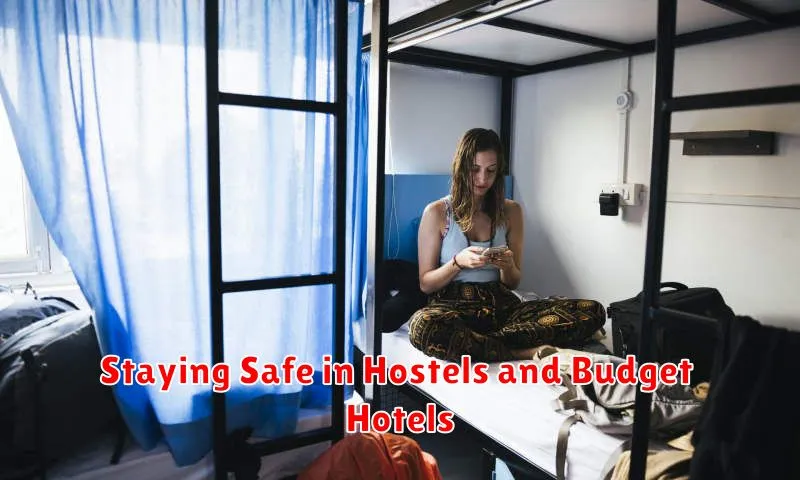Staying safe while traveling is paramount, especially when choosing budget-friendly accommodations like hostels and budget hotels. While these options offer fantastic opportunities to save money and connect with fellow travelers, it’s essential to be aware of potential safety concerns and take proactive steps to protect yourself and your belongings. This article will provide valuable tips and practical advice on staying safe in hostels and budget hotels, allowing you to enjoy your travels with peace of mind.
From securing your valuables with lockers and padlocks to choosing accommodations with robust security measures, we’ll cover a range of essential precautions. We’ll also discuss important considerations such as researching neighborhood safety, understanding fire safety protocols, and being mindful of your surroundings. By following these guidelines, you can minimize risks and maximize your enjoyment of the hostel and budget hotel experience. Learn how to stay safe while embracing the social atmosphere and affordability these accommodations offer.
Choosing Reputable Accommodations
Prioritizing safety starts with selecting the right place to stay. Thoroughly research potential hostels and budget hotels. Look for establishments with positive reviews focusing on safety and security measures.
Check if they have 24/7 reception, secure lockers, and well-lit common areas. Consider the neighborhood’s safety and accessibility to transportation. Reading recent reviews can offer insights into the current state of the accommodation.
Checking Reviews for Red Flags
Before booking, thoroughly examine reviews. Look for recurring complaints. A few negative comments might be outliers, but consistent issues regarding cleanliness, security, or staff behavior are significant red flags.
Pay attention to reviews mentioning bed bugs, theft, or unresponsive management. These are serious concerns that should not be ignored. Also, consider the overall tone of the reviews. A generally negative sentiment, even without specific complaints, can be telling.
Locking Up Your Belongings
When staying in hostels or budget hotels, security is a key concern. Most accommodations provide lockers or secure storage options. Always utilize these facilities.
Use a high-quality padlock to secure your belongings. Don’t rely on provided locks, as they may be easily compromised. Keep valuables such as passports, electronics, and cash in your locker. Consider carrying a small cable lock for securing your bag to your bed or other immovable objects when you’re in the room.
Avoiding Sharing Sensitive Info

In shared accommodations, be mindful of the information you divulge. Avoid openly discussing financial details, travel plans, or personal information that could be exploited. Be cautious about who you trust, even among fellow travelers.
Secure your passport, tickets, and other important documents. Utilize lockers provided by the hostel or hotel, and consider carrying a small lock for your luggage. Don’t leave valuable items unattended in common areas.
Using Personal Safety Alarms
Personal safety alarms are small, portable devices that emit a loud siren when activated. They can be a valuable tool for deterring potential attackers and alerting others to a dangerous situation. Consider carrying one, especially when traveling alone or in unfamiliar areas.
Choose an alarm with a high decibel rating and a sturdy keychain or clip for easy access. Test it regularly to ensure it’s functioning correctly. Keep the alarm within easy reach, such as attached to your bag or held in your hand while walking alone at night.
If you feel threatened, activate the alarm to draw attention and potentially frighten off an attacker. Remember, these alarms are designed to create a distraction and alert others to your situation.
Building Trust with Roommates
Sharing a room with strangers necessitates a degree of caution. While not everyone is a threat, it’s wise to establish a basic level of trust. Open communication is key. Introduce yourself and engage in polite conversation. Observe their behavior and interactions with others.
Secure your valuables. Utilize lockers provided by the hostel or keep important items close. This isn’t about distrust, but rather taking proactive steps to protect yourself. A visible padlock can also deter opportunistic theft.
Knowing Exit Routes in Emergencies
In any accommodation, especially budget-friendly options, knowing the escape routes is crucial. Familiarize yourself with the closest exits to your room upon arrival. Don’t just rely on the obvious routes. Look for alternative escape paths and emergency exits.
Take a moment to locate fire alarms and extinguishers. Understanding their locations can save precious time in a crisis. In case of fire, stay low to the ground to avoid smoke inhalation.

